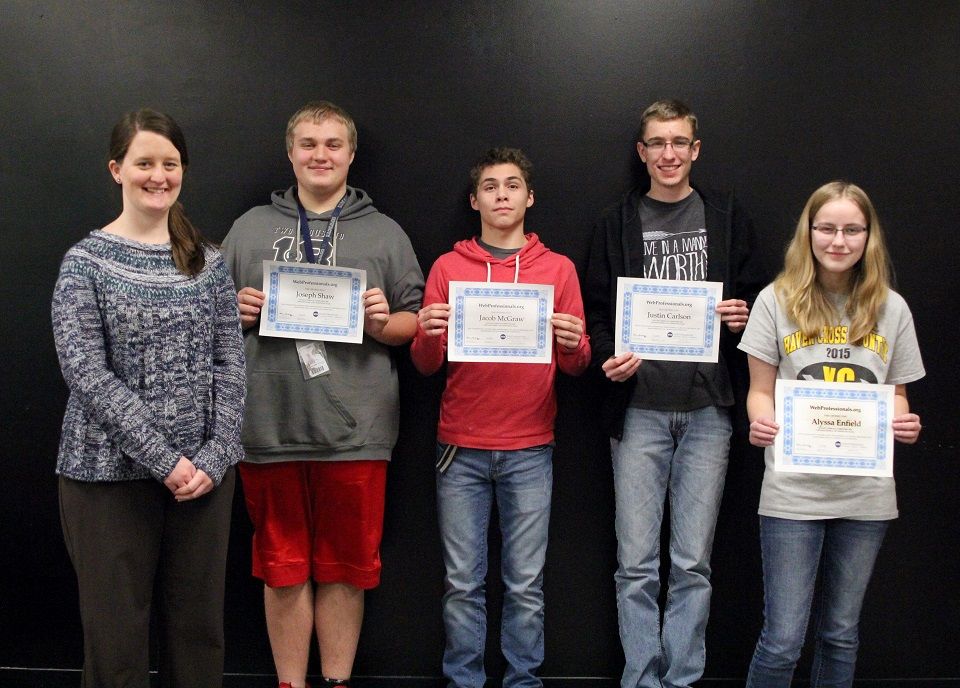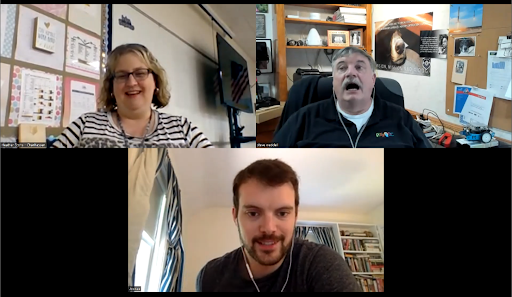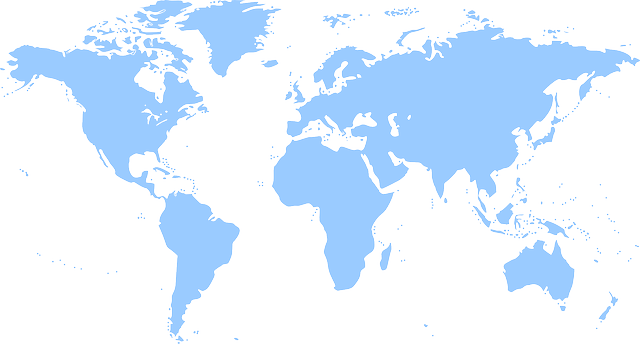Blog
How One Teacher Helped Her Students Earn Web Design Certificates
We caught up with Heather S., who teaches at Chanhassen High School in Chanhassen, Minnesota, to chat about her recent successes with students in the classroom. Heather teaches Marketing and Introduction to Business and Web Design, and is also a DECA Advisor. She recently led her students through CTeLearning’s Web Design curriculum , which culminated in a number of her students earning Certified Web Designer certificates thanks to CTeLearning’s partnership with the Web Professionals Organization . Heather was instrumental in securing the curriculum and web design certificates for her students as well as introducing them to web design, which is an in-demand and high-paying STEM career path.
Heather’s students were the first in Minnesota to earn certificates through our new embedded certificate program, in which students earn certificates as they progress through the course and build a body of work rather than take a big exam at the end of the course. This removes test anxiety for students and allows them to focus fully on building real-world projects to develop proficiency.
The following students earned their Certified Web Designer certificates: Alijah A., Wyatt B., Mason B., Alayna C., Joe G., James G., Keyon J., Jack K., Parker M., Elizabeth N., Aayan S., and Brockden W.
What has your experience been like teaching the course?
It’s a new course for the students since we haven’t taught web design in a few years here. However, the CTeLearning curriculum made it easy to start from scratch—both for me as the teacher and for the students. I definitely have students that excel and keep trying new things, while some others did not quite do enough work to earn the certificate. I enjoy how the course enables students to work on their own. So a lot of them are enjoying it and having fun with it.
What have your students learned about the web design career pathway?
It’s nice because a lot of students are realizing how exciting this career pathway can be. And of course, some of my students are not big fans of coding—which is totally fine. The curriculum is useful because it teaches students skills and opens their eyes to a potential future, but it doesn’t lock them into it. They have really gained an understanding of the importance of having a background in coding in this economy. Even if they decide that coding isn’t for them, it is still a valuable opportunity.
What do parents think of the curriculum?
We have great parents, and they love what we are doing. They see the value of our students finding out now what career pathways they might be interested in pursuing (and those they aren’t interested in). They realize we are helping their kids learn about themselves and their career goals, and they love the fact that their students are taking career prep courses without the family needing to spend money on university courses for something the kid won’t do.
What do your students think about the opportunity to earn web design certificates?
This is a new concept for them. I do a lot of other courses with articulated college credit. Sometimes that means a student may need to check to see if the college they are looking at will take the credit. Most of my students are more used to hearing about AP and credits. However, they understand the world of work is changing, especially in tech, and many are interested in getting into careers without pursuing a four-year degree. The international industry-recognized certificates look good on college applications for my students who are going that route and open doors for students who want to go directly into the workforce. It is nice to be able to help students to have real choices for their futures.
Clockwise from top left: Heather S., Steve Waddell, Joshua Frisch
What do you like about the interactive nature of the Web Design curriculum?
I definitely liked how they had a sandbox to be able to try things immediately.Some of my students did flip through some of the videos quickly, and then they’d have to go back and try again. They would ask me to clarify things, but I could point them back to the material. So it taught them to slow down and really understand each concept rather than just rushing throu gh it. You know, it’s not all about memorization, you actually have to show aptitude and be able to do things. Plus, th ey earned their certificates as they completed each piece of the course—so they weren’t apprehensive about an exam at the end. I also appreciate just how interactive the course is. The tutorial videos, images, and text all flow together to have the students do small projects and practice the pieces that then come together when they do the full website development projects. In the end, the students leave with a full portfolio to help them whether they are bound for college or directly to the workforce. I also like the web-based integrated development environment (IDE) that gives my students a place to create where I can look in and track progress. My students loved the ability to share their live websites with family and friends.
What differences do you notice between your students now compared to pre-COVID?
Although I did not teach web design when our class was remote during the pandemic, this curriculum could have been a very beneficial tool during that time. While we love the fact that the web design curriculum can be accessed from anywhere, I think the students are happy to be in the classroom and learning together instead of working over Zoom from home. I will say that we had some students who loved the curriculum so much that they worked on it from home on their own time, which was very exciting to see.
Did you do anything to help students adjust to learning coding?
The only other thing that I added was some breaks for the students. These were creative breaks where we would watch a video or do something that was not directly connected to web design but that would still fuel their creative minds. I think it helps to have some of those little activities to give students something non-technical to do just to recharge. For example, we would watch videos on famous people or topics, and then the students would do a quick write-up on it.
You are the first school in Minnesota to use this new embedded certificate model. How do you like the approach?
I love this embedded approach. It more closely follows how industry rewards achievement by measuring student aptitude for building things, not for test-taking. This style gives me another incentive to help motivate my students. Plus, my administration and the parents appreciate the certificates being underwritten so there is no cost for my school or the parents.
How has your experience been working with Steve and the CTeLearning team?
I like to email a lot and ask questions, and Steve probably spent more time on Zoom with me than with any other teacher this year. Part of that is it was my first year teaching the course, but I appreciate the collaboration. Being able to email or call whenever and have Steve walk me through a situation was great, so that kind of constant communication is a definite benefit.
Congratulations to Heather and Her Students
Mark DuBois, Executive Director of the Web Professionals Organization, said, “The Web Professionals Association has always delivered the message that being a successful professional takes more than just technical skills. To back this up, our Web Designer certificate focuses not only on the technical skills of website development, but brings together aesthetics, ethics, creativity, problem-solving, marketing, and entrepreneurship. Small and large companies need professionals who can craft powerful and meaningful web messages delivered with engaging design and professionals who are always striving to do the best for their clients. On a personal note, I just love seeing the next generation of professionals getting started with their first set of credentials from us. Welcome to all our new Chanhassen Web Designers.”
Joshua Frisch, Lead Content Developer of CTeLearning, said, “Seeing Heather’s students thrive and earn their web design certificates is so rewarding to the entire CTeLearning team and our partner, the Web Professionals Organization. These students can be proud of the portfolios of real projects they have built that they can take with them for whatever comes next. We are proud to partner with high schools, middle schools and workforce development groups all across the country to offer innovative and engaging career and technical education curriculum that prepares students for the changing world of the 21st century economy.”
Learn More About Web Design Certificates and Other CTE Curriculum
Congratulations again to Heather and her students as the first school in Minnesota to earn the web design certificates from the Web Professionals Organization using this new industry relevant model. They were part of the early pilot program, and next year we are turning it on for all of our schools and districts as a way to help industry attract more bright minds to these high demand careers. Our special partnership that underwrites the cost of certificates to help schools and districts save thousands of dollars will continue as well.
Check out our STEM curriculum for high school and middle school and contact us today for a free demo with our founder, Steve Waddell. Call or email us directly at 913-764-4272 or swaddell@ctelearning.com .
The post How One Teacher Helped Her Students Earn Web Design Certificates appeared first on CTeLearning.
Get in touch with us today!
You can book a demo directly using Calendly, call us directly at 913-764-4272 or 877-828-1216, or submit the form below and we will reach out to you.
We look forward to helping you and your students.

Most Recent Posts


About Us
Whether you are a big institution, small school or an individual seeking a new career path, our curriculum is for you.
Request a free demo of our curriculum today to see how you can help fuel our future world.
Get In Touch
PO Box 398 Olathe, KS 66051
hello@CTeLearning.com
Phone: 913-764-4272
Toll Free: 877-828-1216
Fax: 866-307-8112
Email: info@ctelearning.com
Quick Links
All Rights Reserved | Support Learning, Inc.
Web Design by Tekkii




